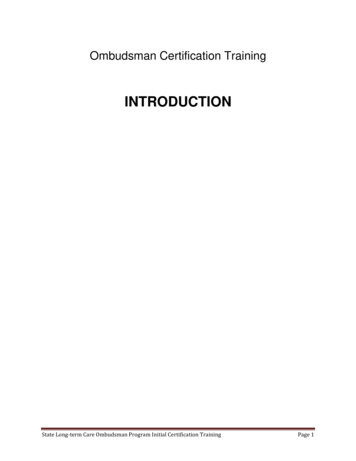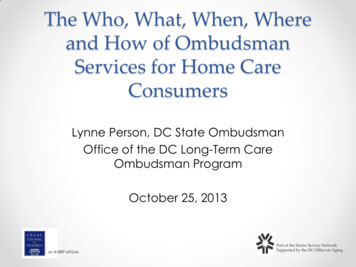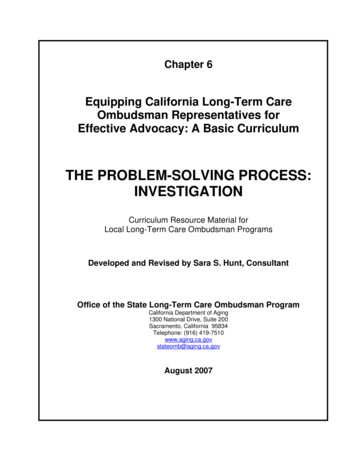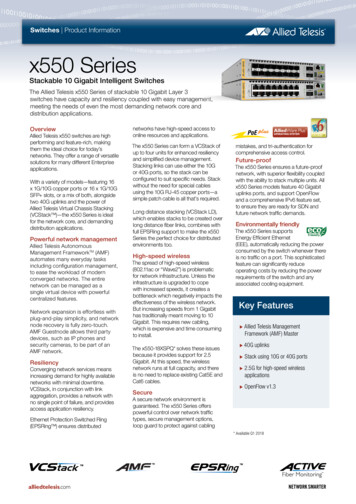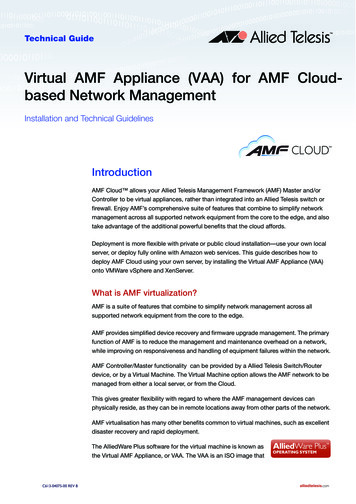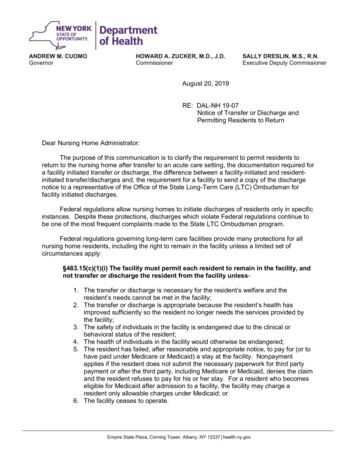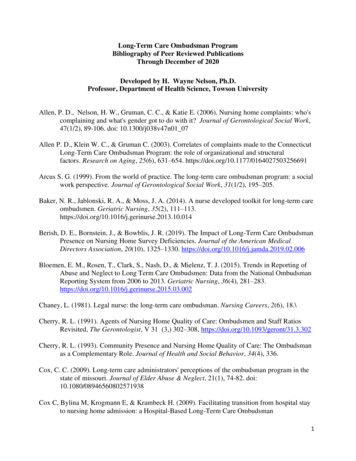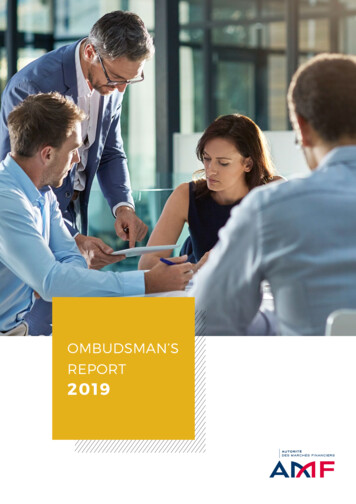
Transcription
OMBUDSMAN’SREPORT2019
Contents 2019 Key Figures . . . . . . . . . . . . . . . . . . . . . . . . . . . . . . . . . . . . . . . . . . . . . . . . . . . . . . . . . . . . . . . . . . . . . . . . . . . . . . . . . . . . . 04 Investigating a mediation case . . . . . . . . . . . . . . . . . . . . . . . . . . . . . . . . . . . . . . . . . . . . . . . . . . . 12 rogress achieved on the two mainPtopics for 2019: PEAs and EmployeeSavings Schemes. . . . . . . . . . . . . . . . . . . . . . . . . . . . . . . . . . . . . . . . . . . . . . . . . . . . . . . . . . . . . . . . . . . . . . . . . . . . . . . . . . . . . 22 The emergence of disputes as a resultof legislative changes: MiFID 2 andanti-money laundering legislation . . . . . . . . . . . . . . . . . . . . . . . . . . . . . . . . . . . . . . . . . . 33 Changing scams:from Forex to Bitcoin . . . . . . . . . . . . . . . . . . . . . . . . . . . . . . . . . . . . . . . . . . . . . . . . . . . . . . . . . . . . . . . . . . . . . . . . . . 36 The Ombudsman’s nationaland international activities . . . . . . . . . . . . . . . . . . . . . . . . . . . . . . . . . . . . . . . . . . . . . . . . . . . . . . . . . . . . 43 he Ombudsman’sTcommunications initiatives . . . . . . . . . . . . . . . . . . . . . . . . . . . . . . . . . . . . . . . . . . . . . . . . . . . . . . . . . . . 45 Appendices.46
EDITOThe Ombudsman’s editorial“In the unprecedented circumstances broughtabout by Covid-19, the AMF Ombudsman’sOffice has taken steps to ensure thatits work can continue despite the healthcrisis, with its entire team working fromhome since 16 March 2020.”29 April 2020The fact that European stock exchanges jumped26% (EuroSTOXX50 index), posting their best performance since 1999, is certainly a factor in the 11% dropin the number of mediation cases received in 2019(1,295 against 1,438). It is not surprising, therefore,that complaints relating to poor information and advicenow represent only a quarter of requests instead ofaround a third.However, a series of other equally positive reasonsalso contributed to this.First, the new computerised screening systemintroduced from spring 2018 for retail investorsusing the form on the AMF website has provedsuccessful: requests that are inadmissible based onthe answers to the questions asked are screened outbefore being recorded as a request in our system.Inadmissible requests from retail investors are redirected but are no longer counted as requests received.Unfortunately, the vast majority of requests (73%) arestill received by post rather than via the online form,and the number of inadmissible cases received by posthas doubled.Second, if we look at the requests received by business sector, it can only be good news that there hasbeen a sharp decline in the number of requests receivedrelating to unauthorised companies offering investments in Forex, the notorious currency speculation thatis so dangerous for retail investors. This is clearly theresult of measures taken by the European SecuritiesMarkets Authority (ESMA) to prohibit the marketing ofbinary options to consumers and of very strict regulation, which has in particular reduced the leverage ofcontracts for difference (CFDs). These measures amplified the effect of the ban on advertising in this sectorimposed by the AMF the previous year. In 2019, theAMF also decided to make the temporary measurestaken at the European level permanent.However, financial scams did not disappear; instead,they shifted. After false diamond investments in 2018,many scammers switched to Bitcoin in 2019. Faced withfraudulent platforms that are increasingly impersonateauthorised companies, the Ombudsman can onlydeclare scam-related cases inadmissible for processingonce the actions have been identified as a criminaloffence. All that remains is the possible question ofverifying the enhanced due diligence of banking institutions during debit and credit transfers, if the conditionsare met.This decrease in the number of requests hasinevitably led to a decrease in the number ofopinions issued by the Ombudsman: 451 comparedwith 523 in 2018. It is worth noting that the percen tage of opinions unfavourable to applicants increasedto 59% (from 55% in 2018).What should we think about this? In the main areaof employee savings schemes (more than a third of therequests processed), the policy of establishing a constructive relationship with the two main retail accountkeepers has helped to improve the informationprovided to retail investors, which is easier to understand and available on the internet. More often than01
OMBUDSMAN’S REPORT 2019before, it is with regard to fairness and not the law thatI have had to become involved with account-keepinginstitutions, to obtain an early release of the assets, i.e.by pointing out the applicant’s difficult financialcircumstances rather than a deficiency of the accountkeeper. Where appropriate and on a case-by-casebasis, I may request support from the French GeneralLabour Directorate. At the same time, through a seriesof more general recommendations, in 2019 the AMFOmbudsman’s Office also contributed to the project tooverhaul the official Employee Savings Guide, which isdue to be published in 2020.WHO IS THE AMF OMBUDSMAN?The AMF Ombudsman is Marielle Cohen-Branche. She was first named AMF Ombudsmanon 16 November 2011. Her appointment has since been renewed, most recently for afurther three years on 12 November 2018.In accordance with new consumer mediation rules, the AMF Ombudsman was registeredwith the CECMC (the French Commission for the Evaluation and Monitoring of ConsumerMediation) as the AMF’s public Ombudsman on 13 January 2016.Ms Cohen-Branche spent eight years as a judge on special assignment to the Court ofCassation with responsibility for banking and financial law (2003-2011). At the same time,she was also: a member of the AMF Enforcement Committee; a member of the Banking Mediation Committee chaired by the Governor of the Banquede France, responsible for supervising the independence of banking Ombudsmen (20032012); a member of the World Bank Sanctions Board responsible for anti-corruption (2007-2013).Formerly, she worked as a legal expert in banking for 25 years. Since 15 October 2013,in parallel with her duties as AMF Ombudsman, Ms Cohen-Branche has been a memberof the International World Bank Administrative Tribunal. Her five-year team was renewedin November 2019, when she also became its Vice Chairman.She is an Officier de la Légion d’honneur and an Officier de l’Ordre national du mérite.As Ombudsman, she relies on a team of five legal experts who work exclusively for her.This team is led by François Denis du Péage, Deputy Ombudsman in the AMF’s RetailInvestor Relations and Protection Directorate.02
EDITOWhat remains stable in terms of statistics, andwhat is most important to me, is the follow-uprate on the opinion proposals issued. Only 4% ofunfavourable opinions were disputed by investors.Opinions favourable to investors were not followed by4% of the parties (2% by firms and 2% by investorswhen the opinion was partially favourable).In 2019, more than 250 financial institutionsand practitioners were invited to enter into mediation. I thought it would be useful to take this opportunity to remind everyone of how an investigation isconducted during mediation. For the first time, thisOmbudsman’s Annual Report will name the firm thatabruptly and systematically refused to enter into mediation. Confidentiality, pursuant to Article 1531 of theCode of Civil Procedure, protects only those partieswho have agreed to enter into mediation in an attemptto resolve disputes amicably. It is of course alwayspossible for a firm to refuse to enter into mediationfrom time to time. However, a policy of systematicallyrefusing to enter into mediation is not covered by thisconfidentiality.The general recommendations, to which I alsoremain committed as a result of the AMF’s veryproductive collaboration with the AMF’s RetailInvestor Relations and Protection Directorate(DREP) headed by Claire Castanet, have led to realprogress through the PACTE Law, whether in thecase of PEAs, concerning shares in companies in administration, or in the case of employee savings schemes,where the early release of retirement savings arisingfrom the default investment is now possible within amonth of notification. This progress will be presentedmore fully in this 2019 report.Beyond these general recommendations, I ampleased to see that visits to the Ombudsman’s OnlineDiary, which each month anonymously analyses amediation case selected on the basis that it offers thebroadest possible lessons learned, continue to growsteadily year after year (up 8% in 2019). It is alsoencouraging to be told that these monthly cases arebuilding into a “corpus of AMF Ombudsman policy”that both major financial institutions and retail investorpublications claim to follow and consider.More often than not, financial instruments continueto be a very complex area, and the work of the entireteam of legal experts led by François Denis du Péage,my deputy, is absolutely essential to unravel the tangleof obligations of the various parties. This complexitysometimes even leads to a long chain of actors whosometimes require even more time because there iscurrently no legal time limit in our country for a firm torespond to a consumer ombudsman.This year, I thought it would be useful to examinePEA issues in greater depth, especially in light of thesignificant parallel changes that the legislator made toits major rules in the 2019 PACTE Law. In addition,another study also focuses on complex, highly speculative products such as warrants, turbos and certificatesissued by banks.Lastly, I cannot end this editorial without mentioningthat the CECMC (the French Commission for theEvaluation and Monitoring of Consumer Mediation) isnow chaired, since March 2019, by a State Councillor,Marc El Nouchi, and vice-chaired by a Justice of theCourt of Cassation, Edith Sudre. At a time when variousforms of amicable mediation are constantly developing,sometimes in disparate ways, it is important to highlight that, following the transposition into French lawof a European Directive, consumer ombudsmen are theonly ombudsmen who are available free of charge toconsumers, are required to publish an annual report tojustify their results and are regulated with regard totheir appointment and processes. It is because of thistype of legal mechanism, intended to instil confidencein all parties, that the process of amicable dispute resolution is almost guaranteed to be successful.Paris, 3 February 2020Marielle Cohen-Branche03
OMBUDSMAN’S REPORT 2019 0192Key FiguresIn 2019, the Ombudsman’s Office recorded adecrease in the number of requests received: 1,295compared with 1,438 in 2018 (-11%). However, thisdecrease was less marked (-6%) for requests receivedin the Ombudsman’s jurisdiction: 762 requests compared with 813 in 2018. The Ombudsman’s Officetherefore received a smaller proportion of requests thatfell outside its jurisdiction. This downward trend canbe attributed to the implementation of screening in2018, which asks a series of questions for requestssubmitted using the online form. Since its introduction,the number of cases outside the AMF Ombudsman’sjurisdiction received through this channel has fallenfrom 46% in 2017 to 27% in 2018 and 22% in 2019.If this trend is to continue, investors should makegreater use of the form available on the AMF websitefor referring cases to the Ombudsman’s Office. Thisreferral channel accounts for only 27% of requestsreceived. Unfortunately, the vast majority of retail investors continue to refer cases to the Ombudsman’s Officeby post (73%), and these percentages do not changesignificantly from one year to the next.The fact remains that analysis of the responses tousers of the form show that only 11% of visitors declarethat they have met the various admissibility requirements and that only 50% of these potential applicantsactually send the form and therefore take action.The admissibility of cases is examined as soon as theyarrive. Some can then be closed for various reasons:absence of prior complaint, late requests (where thecomplaint is made over a year ago), requests referredto another Ombudsman (a case cannot be referred totwo Ombudsmen at the same time or as a result of thesame dispute), legal proceedings (legal action has beentaken), a request that is a consultation or an alert andnot a mediation request, and requests that cannot beprocessed.In total, the number of cases processed and closedin 2019 was 1,322, compared with 1,406 in 2018(-6%). Each year, the difference between the numberof cases received and the number of cases processedand closed is reflected in the change in the backlogof open cases at the beginning and end of the year.As at 31 December 2019, the backlog of open caseswas 298 compared with 323 a year earlier (-8%).Cases received outside the Ombudsman’s jurisdictionare quickly redirected to the appropriate Ombudsman.Of the 551 cases processed and closed outside theOmbudsman’s jurisdiction in 2019 (compared with631 in 2018), 372 were from the banking sector,representing, as every year, almost two thirds of thesecases.Deputy Ombudsman04It is actually very difficult for retail investors to distinguish between bank investments (regulated savingsand fixed-term accounts), insurance investments (eurodenominated or unit-linked life insurance policies) andfinancial investments (stock market, OPCs, tracker,SCPIs, FCPIs, PEAs, etc.). Similarly, a distinction shouldbe drawn between services linked to execution orders,financial advice, custody account-keeping (with cost
GRAPH 2.Number of cases processed1,4381,3611,4061,29516002019 KEY FIGURESGRAPH 1.Number of cases 20055100201720182017201920182019Outside the Ombudsman’s jurisdictionWithin the Ombudsman’s jurisdictionGRAPH 3.Details of lack of jurisdiction riminal05
OMBUDSMAN’S REPORT 2019price calculation) and account transfers, which arecovered by the AMF Ombudsman, and tax calculationslinked to securities account-keeping, tax interpretationsof financial transactions, disputes over bank fees, etc.,which are not covered by the AMF Ombudsman.The fact remains that financial institutions arerequired to inform their customers as clearly as possibleabout the relevant consumer ombudsmen.For cases outside the Ombudsman’s jurisdictionwhere the dispute relates to a criminal offence, therecan be no mediation. The case is then sent to the PublicProsecutor (35 cases in 2019). Of these, 17 complaintsconcerned crypto-asset fraud.The questions asked of retail investors onthe AMF website as part of the mediationrequest form, supported by specific examples, are as follows: what is the nature ofyour dispute (banking, life insurance, tax,credit or financial)? Has your dispute beenreviewed by another ombudsman? By acourt? Have you filed a complaint? Have yousubmitted a prior written complaint to therelevant institution? On which date?06In 2019, 771 cases were processed and closed withinthe AMF Ombudsman’s jurisdiction (777 in 2018). Ofthese cases, 320 of which have not yet resulted in anopinion proposal, the following should be noted inparticular: 194 cases were closed because they were referredprematurely, since the retail investor provided noproof that a prior claim had been rejected or gonewithout a response for at least two months; 9 cases were closed because they could not beprocessed; 3 because they were subject to legal proceedingsincompatible with mediation, which is an amicableprocess; 12 because the case had also been submitted toanother Ombudsman; 3 as late requests where the prior complaint was dated more than a year before, which is no longer admissible since the transposition into French law of theEuropean directive on mediation; 11 cases had to be reclassified as alerts, as theysought to expose a practice without claiming compensation. Once reclassified as alerts, these cases areforwarded to the relevant AMF staff for monitoring; 12 cases had to be reclassified as consultations, asthey involved questions for the Ombudsman but nodispute was referred; 39 cases were closed because they were abandoned,as permitted under the charter, either because thedispute was settled after the referral was received, orbecause the retail investor did not provide the evidence necessary to continue processing the case; 27 cases involved firms who rejected the mediationprocedure, compared with 16 in 2018. There is a boxon page 20 on the loss of confidentiality that accompanies the firm’s right not to enter into mediationfrom time to time.
2019 KEY FIGURESGRAPH 4.Reasons for closing the 1,322 cases processed in 2019 compared with 20181,322-6% on 2018 (1,408)cases processed in 2019Lack of jurisdiction type551cases processed outsidethe Ombudsman’s jurisdictionBanking372Life Insurance92Criminal35Geographical771Number of lackof jurisdiction casesprocessed6Tax16Other30-1% on 2018 (777)cases processed outsidethe Ombudsman’s jurisdiction in 2019Reasons for closingPremature request254cases not processedon their merits194Request reclassified as consultation12Request reclassified as alert11Late request3Legal proceedings3Submitted to another OmbudsmanNot able to be processedOther517Number of casesclosed12910-14% on 2018 (603)mediation procedures initiated in 2019Reasons for closing80cases suspended451Number of casesclosedAbandoned by the applicant39Mediation procedures rejectedor abandoned by the firm27-14% on 2018 (523)opinions issued in 201907
OMBUDSMAN’S REPORT 2019In total, 451 cases were subject to an opinion proposal in 2019, compared with 523 in 2018.Those 451 opinion proposals, also referred to asOmbudsman’s recommendations, were favourable tothe applicant in 183 cases (i.e. 41%) and unfavourableto the applicant in 268 cases (i.e. 59%). It is noted thata high rate of favourable recommendations cannot bean objective in itself, since the nature of the recommendation depends on the intrinsic characteristics ofthe case, i.e. on the merits of the request.The level of compliance with the Ombudsman’s recommendations can be expressed in two ways: firstly,97% of proposals, when they are favourable to retailinvestors, were followed by both parties; and secondly,only 4% of recommendations unfavourable to retailinvestors were appealed by them. This results in anoverall compliance rate of 96%. These percentages areagain good, as every year. They mean that, for mostcases submitted, retail investors have found mediationto be a way of resolving their disputes without resorting to the courts. It should be noted that in the eventof persistent disagreement, retail investors always havethe possibility of bringing their dispute before thecourts. They are systematically reminded of this, asrequired by regulations (Article R. 612-4 of the FrenchConsumer Code).IN 2019, CASES PROCESSEDAND CLOSED CONCERNED250 DIFFERENT INSTITUTIONS(308 IN 2018):investment services providers, financialinvestment advisers, market undertakings,unregulated service providers, listed companies and portfolio management companies. The vast majority of cases (80%) wererelated to investment services providers.08Ombudsman’s Office traineelegal expert
2019 KEY FIGURESGRAPH 5.Breakdown and acceptance of opinions issued in 201941%451of recommendationswere (partiallyor completely)favourableto applicants97%of favourablerecommendations wereaccepted by both partiesrecommendations in 201959%of recommendationswere unfavourableto applicants4%only of applicantsfor whom therecommendation wasunfavourable stated thatthey were not satisfiedGRAPH 5.Breakdown of financial institutions involved in mediation in 2019Financial investmentadvisory firms2%Investment servicesproviders80%Portfolio managementcompanies5%Other10%Unregulatedservices providers3%09
OMBUDSMAN’S REPORT 2019Mediation topicsA topic-based classification system has been developed according to the type of complaint encountered: poor execution; poor information or advice; mismanagement; issuer complaints; others.In 2019, the top two categories of complaints represented 89% of mediation cases processed.Mismanagement accounted for only 5%.Each year, the topics addressed differ widely, as illustrated by the Ombudsman’s Online Diary, which is published monthly on the AMF website (see page 45).In addition to recurrent disputes, the Ombudsmannoted three significant trends in 2019: c ases linked to Forex speculation by individualsdecreased significantly again and represented only1% of cases (6% in 2018); there are still a significant number of cases related toemployee savings schemes; there is a trend towards an increase in the number ofcases related to PEAs (Equity Savings Plans).10As every year, the Ombudsman also receives casesdealing with shares, bonds, company shares and warrants (BSAs) held directly and through collective investment products. It should also be noted that there arecases involving certificates, warrants and turbos, whichare speculative products with very specific problemsconcerning issuers, clearing members and accountkeepers, which are examined by the Ombudsman andare discussed in part of this Annual Report.
2019 KEY FIGURESGRAPH 7.% cases by reason for the complaintOther reasons4.0%Issuer complaints2.5%Lack of/poor informationor advice27.8%Lack of/poor execution60.7%Lack of/poor management5.0%GRAPH 8.Cases closed due to poor executionOther lack of/poorexecution: 15.84%Termination/refusalto provide service: 1.23%Stock-market order: 2.26%Failure to returnfunds: 33.13%Securities transactioninstruction: 3.91%Allocation decisions: 10.49%Hedging: 0.21%Fees (modificationor dispute): 8.85%Facility/account transferinstruction: 14.61%Account closureinstruction: 5.76%Collective investmentundertaking (CIU)instruction: 3.70%GRAPH 9.Cases closed due to inadequate information or adviceOther lack of/poorinformation/advice: 8.97%Other information(custody account-keeper): 2.69%Transfer/Execution: 3.14%Allocation decisions: 9.42%Misleading or unbalancedadvertising: 0.45%Investment advice: 27.35%Aggressive salespractices: 11.21%Custody account-keeperperiodic disclosures(opinions/statements): 0.45%CIU periodicdisclosures: 0.90%CIU modifications: 0.45%Fees: 14.35%Tax: 3.59%Order execution: 3.14%Early release: 13.90%11
OMBUDSMAN’S REPORT 2019I nvestigatinga mediation caseMediation processThe AMF’s mediation process consists of severalstages.A case is created as soon as the complainant contacts the Ombudsman’s Office.In accordance with Article L. 612-2 of the FrenchConsumer Code, the case may not be admissible forvarious reasons: the dispute does not fall within the Ombudsman’sjurisdiction; n o prior complaint has been made to the firmconcerned; the case has been referred to another ombudsman; legal proceedings have been commenced; the prior complaint is too old (made more than ayear ago); the request is not a mediation request but an alert ora consultation; the request cannot be processed.The case must be declared inadmissible within 21 days.If the case is admissible, and unless the Ombudsmanis able to give her opinion based only on the attachments to the complainant’s request, which is rare, anexamination of the case requires that the Office senda written questionnaire to the financial institution toobtain its comments and supporting documentationand that it requests clarification or additional information from the complainant.Financial institutions are invited to answer theOmbudsman’s request for comments within 30 days.However, there is no legislation requiring them to doso. It is sometimes necessary to chase up an institutionseveral times or to send the questionnaire again beforeobtaining a full response, accompanied by the relevantsupporting documents enabling the Ombudsman tomake a recommendation based on a complete case file.12Ombudsman’s Office legal expertIf a response is not forthcoming after two reminders,as occurred with 27 cases in 2019 (5% of cases openedon their merits), half of which were FIAs and the investment management company Nestadio, theOmbudsman considers that the firm is refusing to enterinto mediation, which is its right. However, theOmbudsman also reminds the firm that its refusal is notcovered by confidentiality because mediation has notyet been able to begin due to a lack of agreementbetween the two parties.
INVESTIGATING A MEDIATION CASEWhat makes a case complexand what are the implications?Requests submitted to the Ombudsman, which coverthe AMF’s entire jurisdiction, are diverse and relate toan extremely broad and generally complex field. Inaddition to this very broad scope, complexity variesfrom case to case. Complexity, which remains thedetermining factor in investigating a mediation case, isassessed according to various criteria that can sometimes be combined.Complexity may also lie in the fact that a case raisesa technical or even entirely new issue. While some ofthe problems encountered in mediation are recurring– and are therefore well known and dealt with withoutany particular intrinsic difficulty – a case may involveunique aspects and therefore require further in-depthresearch in order to fully understand the dispute andbetter identify the issues it raises.A case can also be complex because it involves several parties. This increases not only the number ofrequests sent to the various firms involved, but also thetime required to examine the answers provided tothese requests and, in some cases, to analyse the chainof responsibility of each of the parties involved. Thissituation, as perfectly illustrated by the cases relatingto the early delisting of certificates (see page 19), obviously has an impact on the length of time it takes toinvestigate the case.Sometimes, certain requests require the Ombudsmanto go beyond a “traditional” investigation of a case bycollecting and comparing the written observations ofboth parties and analysing them from the perspectiveof law and fairness.The Ombudsman, in order to support her analysis,may invite, for informational purposes, third parties toparticipate in the mediation process while ensuring thatit remains confidential. Most of the time in these cases,this information is invaluable in reaching a solution; atthe very least, it improves the overall understanding ofthe case.“Sometimes, certainrequests requirethe Ombudsman to gobeyond a ‘traditional’investigation.”13
OMBUDSMAN’S REPORT 2019This was the situation in the case where an applicant,a holder of turbo calls that he wanted to sell, arguedthat there was a lack of activity in the market concerned until the turbos were deactivated. The applicantconsidered that he had been the victim of a computermalfunction suffered by the issuer of the turbos concerned, which had deprived him of the option to sellhis securities before they were deactivated, and heasked the Ombudsman to intervene.In this case, the first step was to talk to the issuer,which indicated that it had indeed suffered a computermalfunction on that day and that it had set up a procedure that same day for its clients to request a gestureof goodwill by post, email or phone.The issuer stressed that the applicant had not takenadvantage of this procedure but that his request wasstill admissible subject to the provision of certain supporting documents, in particular proof of the client’swillingness to sell his certificates (screenshot, confirmation of the sell order, etc.).The complainant who was asked to provide the supporting documents indicated that he did not have awritten document, but that on the day of the computermalfunction, he had called his financial intermediary’scall centre. The Ombudsman immediately contactedthe intermediary concerned, a third party to the mediation, to ask them to send her the recorded phone conversation, which they did without any problem. Havinglistened to the phone conversation, it was obvious tothe Ombudsman that the applicant intended to sell.This information was therefore passed on to the issuer,which agreed to pay the applicant a gesture of goodwill equivalent to the difference between the residualvalue of the product at the time of its deactivation andthe level of his limit order, i.e. 450.In most cases where the dispute between the applicant and their financial intermediary concerns a stockmarket transaction, the Ombudsman may have to consult Euronext Paris directly to obtain information thatonly it holds in its capacity as a market operator.In another case, the applicant challenged the can cellation of a sell order executed at a price that wasparticularly favourable to him.After careful examination, it appeared that the orderhad been executed at a price 36 times higher than thelimit set by the applicant, which explained not only whythe transaction could be cancelled – because it wasexecuted at an aberrant price – but also why the applicant strongly contested this cancellation.When questioned by the Ombudsman, the marketoperator was able to provide proof that it had not cancelled the trade at issue in the dispute1, as the applicanthad assumed. No trade corresponding to the characteristics of the applicant’s order had been recorded on
financial investments (stock market, OPCs, tracker, SCPIs, FCPIs, PEAs, etc.). Similarly, a distinction should be drawn between services linked to execution orders, financial advice, custody account-keeping (with cost In 2019, the Ombudsman's Office recorded a decrease in the number of requests received: 1,295 compared with 1,438 in 2018 (-11%).

